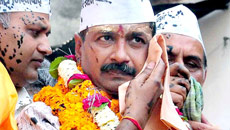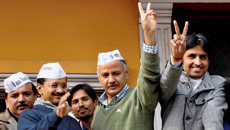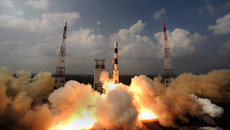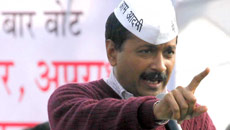The tide has turned so much so that today a growing number of Catholic priests from India travel to, stay on and settle in the United States to minister to the needs of the faithful there.
A new book looks at this trend, at the priests' challenges there and what their new lives means to them.
For centuries, till quite recently, India was a destination for missionaries. Some settled here from the 14th century onwards, a process that picked up with the advent of the Portuguese in the late 15th century.
"Everything is Grace" (Goa1556, pp.328, Rs.400) a book by the earlier Bombay (Mumbai)-based priest, George Aranha, Ed.D., says: "More and more of the priests who are active in this country (the US) are immigrants like me from other countries."
Aranha's book says that between 1965 and 2005, the number of Catholic diocesan and religious priests in the US fell from 58,632 to 42,839 while the US Catholic population grew from 45.6 million to 64.8 million.
"The number of Catholics in the United States has consistently grown because of an increase in conversions, births as well as in immigration from Mexico, Central America, South America, the Philippines, Vietnam and several other countries. Yet, the number of priests has not kept up with the demands and the needs of the Church," he writes.
Earlier, missionaries to the US were Italian, French, Spanish and Portuguese, with the vast majority coming from Ireland. "Today, an America might ask me: 'But what is your real Indian name?' Americans are generally surprised that both my parents and all my siblings, including me, have strong English and Christian names," he writes.
The 1950-born Konkani-origin priest of Mangalorean origin also describes what it was like "growing up Catholic in India" in times which were tough for the country. His large family - parents and nine siblings living in one large room - makes for the setting for the story, the Bombay of the 1950s and the 1960s.
Aranha (64), still remembered by some for his work in the parishes of Bombay, talks about his crushes as an adolescent, and his latter entry into the seminary at Goregaon in Bombay.
In those times, Spanish Jesuit professors and administrators ran the Seminary. Today, notes Aranha, India itself has the second largest number of Jesuit priests and brothers in the world.
The mosquito-ridden locality of Goregaon's seminary looked wealthy but really wasn't. "Since we all came from relatively poor families, no fixed tuition was expected, just whatever the family could afford to donate," he says.
Seminary discipline, feasts, and leaving for Rome to study philosophy and theology with just 21 British pound sterling in his pocket...all went into making a life then.
Aranha narrates his travels through Europe, picking up new languages - French, Spanish, German and Italian.
On his return, he experiences life with underpriviledged children from the Golibar slum nearby. Suggesting that much remains to be done, he opines: "Catholicism has made a huge positive impact in India through her schools, colleges, hospitals and care for the aged and the needy. Even Indian politicians who hate the British and the colonial past of Europe want to send their children to Catholic schools and colleges."
Aranha finally gets permission from the archbishop to serve as a priest in the US. Much of the final 125 or so pages of the book are based on his life there.
"Some want to know why these immigrant priests are coming here when they are needed more urgently in their own lands.... At one time, priests from the United States went to other countries to evangelize; so it's only fair, (others) say, that immigrants now come in this direction to spread the Gospel," he comments.
He cites the decline in religiosity in the West, and "may be a lack of desire for long-term commitment" with modern culture being dominated by "instant foods, quick fixes and multiple choices". Aranha comments: "This makes a priest (in the West) an endangered species."
Aranha narrates his own experiences with gaining US nationality, and completing his doctorate. This story is suffused with personal experiences, unexpected twists, lessons learnt from the most ordinary of events and gratitude for the blessings of daily life. It also list the triumphs and tribulations of Catholic religious life. Aranha attempts to dig out the lessons learnt and share them with his readers in two continents.





